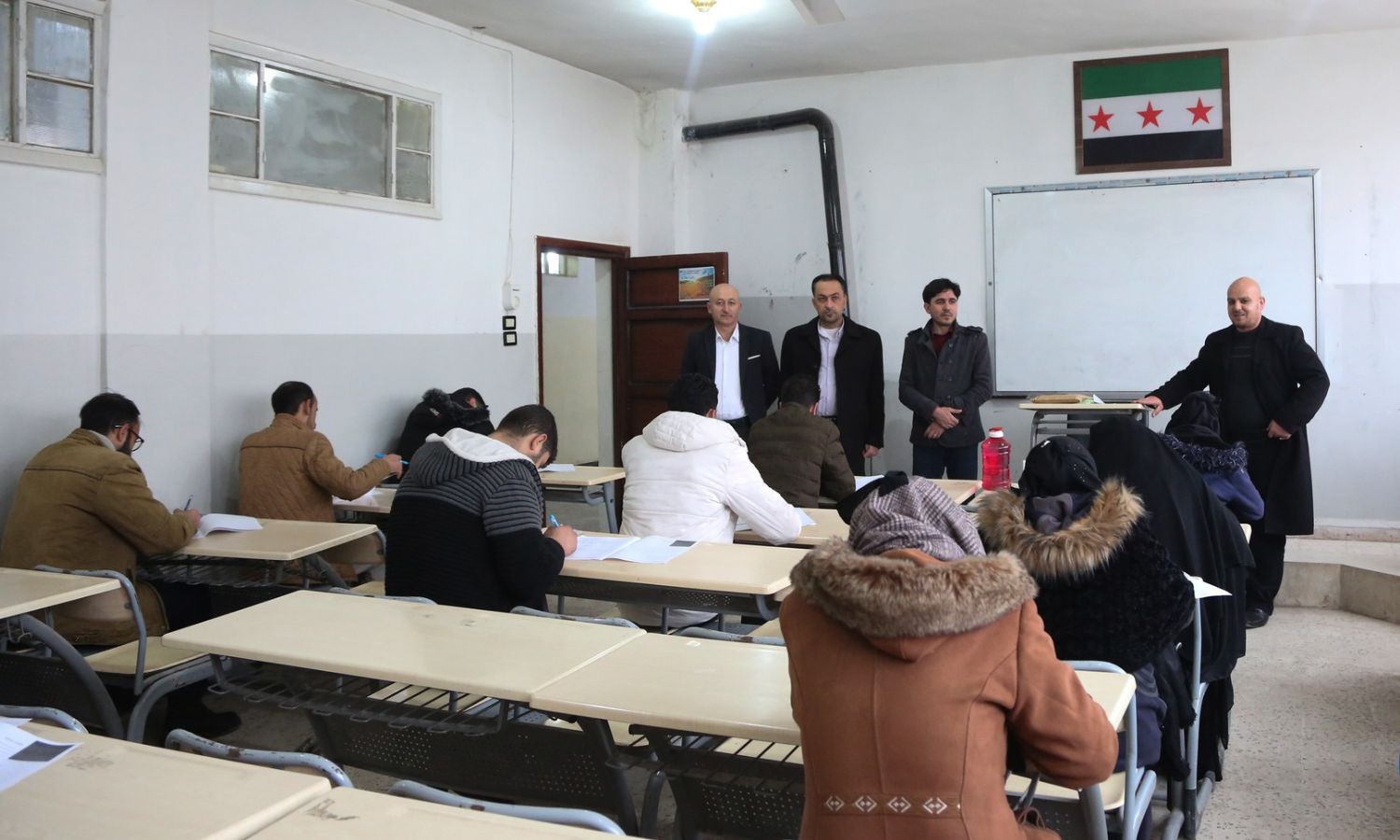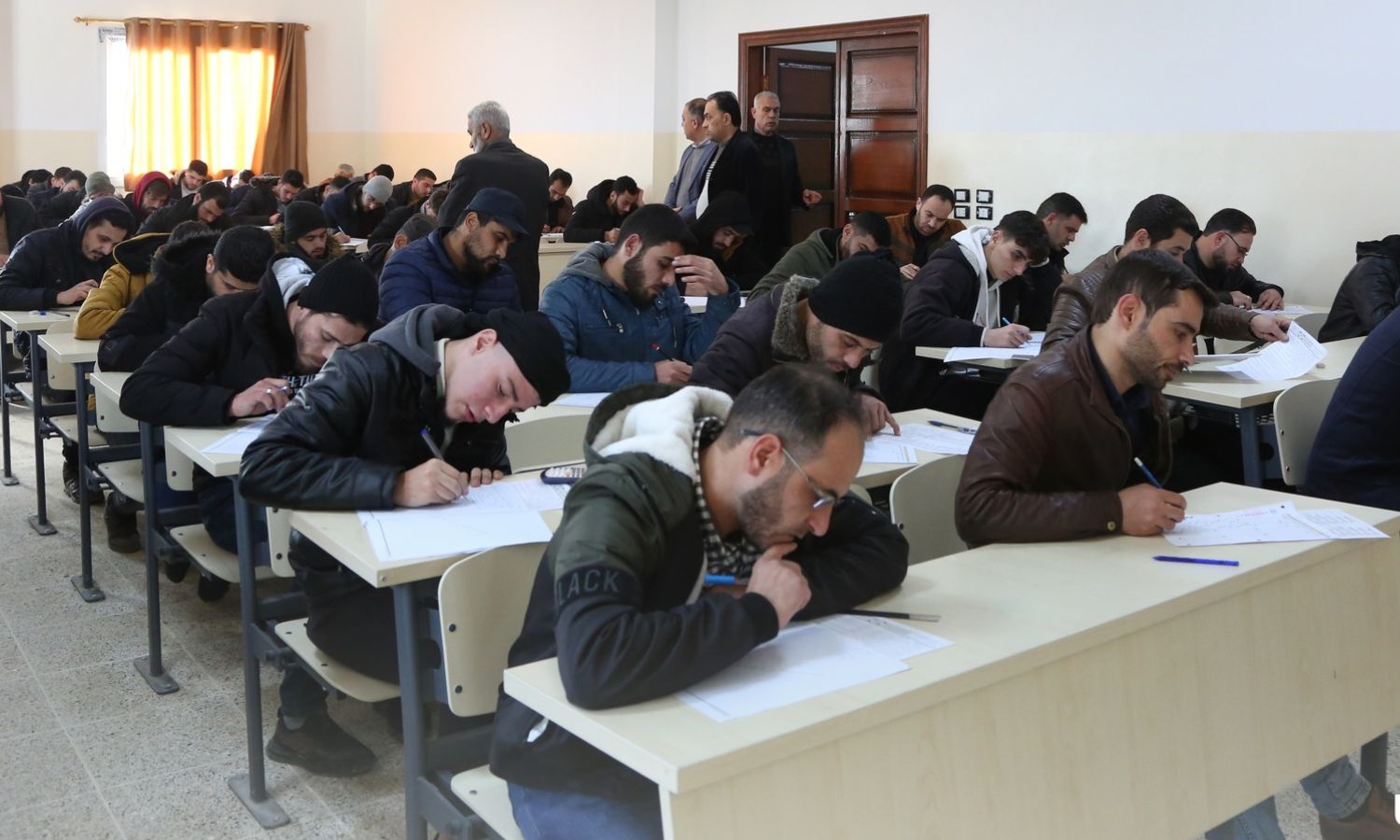



University students in northwestern Syria face difficulties and obstacles that burden them and make studying a burden rather than an easy, desirable process, such as renting housing, high transportation costs, and the lack of job opportunities.
Difficulties are faced by students as a whole, but they are more burdensome for displaced students or those who come from the cities and towns of Idlib governorate to study in the universities of the Aleppo countryside, whether governmental or private.
There are no radical solutions to the problems of students living in the countryside of Aleppo, which is controlled by the Syrian Interim Government (SIG), and in the areas of Idlib, which are controlled by the Syrian Salvation Government (SSG).
Solution efforts are limited to initiatives and donations from some working volunteer organizations and teams amidst a deteriorating economic and living situation in the region.
Ahmed Nai’a, from the town of Salqin, a student at the Faculty of Engineering at the private al-Nahda University in the countryside of Aleppo, told Enab Baladi that renting a house in the countryside of Aleppo is the students’ primary concern, as it amounts to $80 per month (about 1,500 Turkish liras).
In addition to the expenses, the commission amounts to $50 to secure a house for two or three students.
Nai’a says that the condition of the house in terms of cleanliness and services does not amount to the sum paid and is not comparable to the living situation in the area, adding that the high prices of all items, including food commodities or heating, are additional problems that increase the burden of university studies.
For his part, Ahmed Baydoun, who studies at the Free Aleppo University in Azaz, considers that the biggest problem that most students face during their studies is securing income and expenses.
He pointed out that the dental department that he studies is more expensive than others due to the fees, equipment, and tools it requires.
Baydoun, who is from the town of Badama, west of Idlib, pointed out that he has been looking for a job for months but to no avail.
In addition to the previous problems, Omar Zatour from the city of Kafranbel, south of Idlib, who is studying at the Faculty of Media at al-Nahda University in Azaz, said that there are administrative difficulties on the part of the universities themselves.
Zatour explained to Enab Baladi that universities do not provide or offer sufficient practical experiences to qualify him to enter the labor market, whether during or after his study period.
Zatour discloses that he is not familiar with photojournalism or camera training at the university, and this applies to many branches.
A student at al-Nahda University, Muhannad Raseen Jisri, considered, in addition to the previous difficulties, that some real estate offices’ manipulation of students is the biggest problem because they know that students are forced to rent a house in order to save themselves transportation expenses for distant towns and cities.
Jisri told Enab Baladi that some real estate offices take advantage of the students’ need for housing, take a housing guarantee or a “commission” of about $50, and evict them after two or three months for various reasons. Then, the house is rented again to other students, and the same method is adopted with them after a while.
Hala, a mother of three children who studies in the psychological counseling department at the University of Idlib, complains about the distance between the Jisr al-Shughour area where she lives and her university while having a little child does not allow her to attend university sufficiently.
Hala works as a school teacher, and her husband is seriously considering living in the city of Idlib, despite the high rents, but it is a temporary solution to get rid of the burden of daily travel and overcome the difficulties until she graduates from university.
Hala talked about the accumulated pressures of attending school and university, managing the house, and raising children, in addition to the difficulties in securing the necessities of daily life and the high costs of housing, electricity, water, internet, and others.
Enab Baladi met a number of male and female students (married and single) at Idlib University, who come from various regions, such as the countryside of Aleppo and Jisr al-Shughour, while some of whom are displaced from the countryside of Damascus to northern Idlib.
The students of Idlib University talked about difficulties similar to those experienced by students in universities in the countryside of Aleppo.
Student Ahmed Nai’a, who studied for three years at al-Nahda University, explained that organizations and volunteer teams do not focus on supporting students.
The priority for the organizations is focused on the camps and the displaced, according to Nai’a, pointing to the need to allocate a small part of the support to students in their long educational journey.
There are organizations that support the needs of people in northern Syria and allocate part of their support to the educational sector as a whole. Among these organizations is the Emergency Response Team, which organizes campaigns through social media to support students and secure tuition fees for them.
On January 11, the Response Team published statistics of its campaigns over four years in the education sector, which included 6,933 beneficiaries, and the value of the collected donations amounted to $326,150.
Another active organization is the Molham Volunteering Team, which publishes periodically about its adoption of operations to support students, whether in universities or in the early stages of study, as well as paying the costs of teachers for specific classes.
Some entities are also active in establishing some projects, including the Turkish Relief Organization (IHH), which opened on December 27, 2022, a university housing building in the city of Azaz, which includes 40 rooms, a hall, and an administration office, with a capacity of up to 320 students.
The student housing was called “Konya Alâeddin Keykubad Housing” and was established by the IHH branch in the state of Konya. The housing is dedicated to students of the Sham University in Azaz, which was established by the IHH in 2015-2016, and includes about 2,000 students.

Students taking first semester exams at Free Aleppo University in the border Azaz town, in the northern Aleppo countryside – January 2023 (Facebook/Free Aleppo University)
Such problems and difficulties are not new to students, but they are renewed at the beginning of each school season or with each school day, depending on the student’s educational status and his/her ability to secure and keep pace with the educational process.
Students in the countryside of Aleppo, in particular, are also facing several problems that have surfaced recently, including the decisions raised in December 2022 related to tuition fees and installments and academic duration.
The decisions were condemned and met by anger from students who considered them abusive, accusing the Free Aleppo University and its administration of having turned into a “profit, not an educational institution,” which the university denied.
On December 12, 2022, about 25 students from the faculty of dentistry at the Free Aleppo University were prevented from taking their exams for not paying the tuition fees.
Dr. Mohammad Khattab, the dean of the dentistry faculty, told Enab Baladi that the tuition fee is in order to continue the educational process, as the university relies 80 to 85% of its funding on student fees and 15 to 20% on support from some organizations.
Khattab pointed out that if the students do not pay the fees, the university will face a financial problem that will harm their studies, the functioning of the university, the success of the educational process, and the work of the teachers in it, and this is what prompts the university to demand payment and put pressure on the students.
In October 2022, the issue of the media faculty at the Free Aleppo University was raised, which is still witnessing some tensions and accusations between its parties, students, and university administration, amid students’ demands awaiting a response.
if you think the article contain wrong information or you have additional details Send Correction